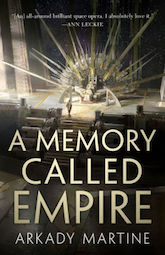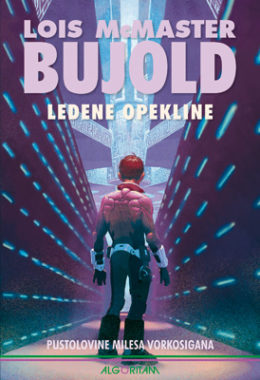For most of this reread, I have introduced each book with an examination of its covers. I didn’t get a chance to do that last week, and I feel like it would be an awkward interjection to do the whole round-up now. But we’re very close to the end of the reread, and I’m not willing to leave it out either. For the next few weeks, I’ll be looking at one cover each week. This week’s is Esad Ribic’s cover for Algoritam’s Croation edition. Esad Ribic is one of the many things I would never have known about if not for this reread. His covers are sometimes mind-twistingly over-wrought—he can be a sensationalist—but his most recent work on the series has been more understated. This cover shows Miles in the cryo-combs. From his equipment, this seems to represent the scene in Chapter Eleven rather than the one that opens the book. The rows of cryo-chamber lights create a sense of three-dimensional space while hemming Miles in. Miles’ body blocks the vanishing point where my eye wants to go, leaving a mystery at the end of the corridor. It’s a thought-provoking visualization of Miles surrounded by death.
A number of comments last week described Cryoburn as a good book, but not one of Bujold’s most captivating. And when I read those comments last week, I agreed. I enjoyed this book when it was first published, but I hadn’t felt compelled to read it twice.
That’s changed.
In the last week, Cryoburn has grabbed me by the eyeballs and refused to let go. We’ve already had a book about the uncertainty of cryo-revival—the brutal and difficult Mirror Dance covered that ground. Cryoburn grapples with the meaning of death. There has been a lot of science fiction about mortality and immortality. Cryoburn is the less common story that tells us why we, and the people around us, must eventually die. I can understand why many fans have not found themselves returning to that message for repeat readings. It’s more than uncomfortable—it’s a masterpiece painted in shades of discomfort. Because it’s true.
In Chapter Three, Jin takes Miles on a tour of the building he lives in. Although it is run-down, the building is connected to the sewer and power grids. It’s home to a community of squatters whose reason for existence isn’t immediately clear to Miles. His immediate goal is to contact the Barrayaran Embassy, and his effort to find a comconsole takes temporary precedence over his desire to understand his surroundings. Suze-san, the leader of this makeshift commune, has a comconsole, but isn’t willing to let Miles use it to call the authorities; her community needs to stay under the radar. Perhaps because she needs to protect her own secrets, Suze tells Miles about Jin’s parents. As Jin reported, his father died in a construction accident. Afterwards, his mother, Lisa, became an activist, advocating for cryo-freezing as a universal human right. After a violent incident at one of her rallies, Lisa was arrested. Allegations of mental illness were made, and Lisa was granted the charity of cryo-freezing until a cure could be found. The political implications of this kind of charity are (I’m so sorry I have to say this, Miles did it too) chilling. Really, beyond the pun, it’s a creative and unprincipled way for an amoral judiciary to suppress political dissent. Don’t want protesters? Freeze them. Lisa’s advocacy for freezing as a universal right may have made her particularly vulnerable to this tactic, but nothing Suze says reveals how, why—or if—Lisa consented to this procedure.
Suze also offers a historical briefing on the consolidation of the cryo-freezing industry. A few decades ago, there were dozens of companies offering cryo-freezing and revival services. Now, the market is dominated by a few conglomerates that have bought up their competitors—corporate stock, inventory, and votes. The building Jin lives on used to be a small cryo-revival facility. It has changed hands at least twice.
Buy the Book


A Memory Called Empire
Limited to websurfing only, Miles catches up on the news—Raven Durona and Armsman Roic are among the abducted. Miles needs to make sure Ekaterin knows he is alive, he needs to free his colleagues, and he needs to learn more about Kibou-Daini in order to further his investigation of the Cryo-corporations. He enlists Jin as a messenger, sending him to the Barrayaran Embassy with a note.
Jin leaves Miles in charge of his rooftop farm, but Miles finds time to investigate the building in Jin’s absence. Miles’s conversation with the cryo-revived Yani provides further hints towards the theme of the novel. Yani was cryo-frozen a century ago, and revived per contract. His revival has not met his expectations—he is not younger, wealthier, or more famous than he was when he went into stasis. He’s the same lonely, angry man he was then, and the world has failed to live up to his expectations. Yani isn’t Barrayaran, so he probably wouldn’t have noticed anyway, but he slept through most of the history that General Piotr made. As he listens, Miles wonders what would have happened if his grandfather had been frozen, instead of dying. Bujold proposes death as a metaphor for biological succession, the wildfire that allows new growth on the forest floor: “What if the only way to effect change on Barrayar had been to violently destroy what had gone before, instead of waiting for the cycle of generations to gracefully remove it?” I note that Barrayaran history has often taken a “yes, and” approach to these options, but recent progress has been more peaceful. The old men must pass so the New Men can rise. Miles has always forgiven Piotr for being who he was, because Piotr taught him to face Barrayar’s brutality. Would Piotr have been able to make amends for his attempts to kill Miles in infancy if he knew that he could live forever? Would Miles have been able to forgive if Piotr was immortal?
Miles’s further investigation reveals that Suze-san is not just providing housing—the building is a cryo-facility. At the moment, it just does freezing, no revives. The custodian, Tenbury, explains that it’s illegal to allow the frozen to thaw and die, but if it happens, they will have died peacefully, “in hope and not despair.” I’m skeptical about the validity of that hope. Cryo-freezing seems to be what people do on Kibou-daini, even though cryo-facilities freeze more people than they revive. Clients see freezing as an alternative to death, but to me it seems like a lottery with very long odds. Like Roic, I’m seeing it as an unusual local burial practice.
If things were easy for Miles, we wouldn’t have a book. Jin reaches the Barrayaran consulate and delivers Miles’s note. The staff there give him a message to bring to Miles, but Jin is arrested in transit. Elsewhere, Roic finally works his chain out of the wall. Next week is all about escapes! Cryoburn is going to continue the theme of how societies deal with the people they don’t want. We’ll dive into that next week.
Ellen Cheeseman-Meyer teaches history and reads a lot.










